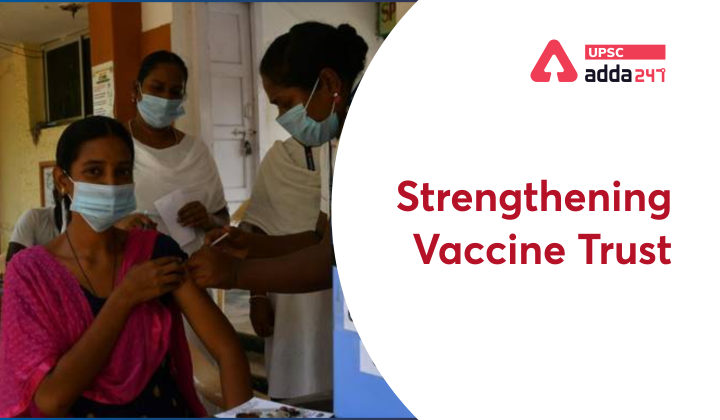Table of Contents
Strengthening Vaccine Trust- Relevance for UPSC Exam
- GS Paper 2: Governance, Administration and Challenges- Government policies and interventions for development in various sectors and issues arising out of their design and implementation.
Strengthening Vaccine Trust- Context
- In India, about 78% of the adult population has received one dose and more than 36% has received both doses.
- This shows that India has found its footing in its campaign to vaccinate citizens against COVID-19.
- Vaccine Acceptance: Recent evidence also indicates that acceptance of COVID-19 vaccines in India is among the highest in the world.
Strengthening Vaccine Trust- Associated Concerns
- Misinformation about vaccines: can erode vaccine confidence among people.
- For example, in 2017-2019, false rumours about the measles-rubella vaccine spread through social media and led to a spike in vaccine refusals in some areas.
- Low enthusiasm for vaccination: enthusiasm to get vaccinated could wane, especially when covid-19 cases are very low.
- Other causes for vaccine hesitancy: People can avoid vaccination due to the following reasons-
- If they are against all vaccines.
- Misinformation and concerns about Vaccine efficacy, especially when vaccines have been developed over a short period of time.
- Mis-information from a trusted family member or friend about the ingredients of the vaccine.
RTS,S or Mosquirix- World’s First Malaria Vaccine Approved by WHO
Strengthening Vaccine Trust- Way Forward
- Ensure vaccination of all: even small pockets of unvaccinated individuals can threaten the success of an immunisation campaign.
- This is especially true for a highly transmissible virus like the Delta variant of SARS-CoV-2.
- Consolidating Vaccine Confidence: Conversations around vaccination should stem from a place of respect, empathy and understanding and should avoid disparaging language.
- This helps build trust — the key to vaccine confidence.
- Countering Mis-information: Providing data from a trusted source, like government agencies or academic institutions, can help correct misperceptions about vaccines.
- In addition, when speaking with peers about misinformation, it helps to acknowledge that it is sometimes difficult in the current context to know what is true and what is not.
- Framing vaccination as the default normative behaviour: this can help encourage those who have doubt.
- we should ask our friends and family, “Teeka lagwaya, na?” or “You’ve been vaccinated, right?”
- Importance of messenger: People often listen to someone who is respected and shares a similar background, community and area. For example,
- A sarpanch or a highly respected individual got vaccinated and encouraged others to do so as well.
- Doctors and health workers are also often trusted sources of information about health decisions.
- Actors and sportspersons are also powerful spokespersons.
- Learning from Polio Campaign: In 2014, India was declared polio-free. It used the simple campaign, ‘Do boond zindagi ki‘ or ‘Two drops of life’. It was hopeful and appealed to Indians.
- The ongoing campaign to vaccinate India requires similar energy.
- Following a Multi-disciplinary Approach: creatives and public health experts must work closely together to bolster vaccine confidence.
- Bollywood is uniquely positioned to tap into the Indian psyche through effective storytelling.
- This is important because not everyone connects in the same way with facts and figures.





 TSPSC Group 1 Question Paper 2024, Downl...
TSPSC Group 1 Question Paper 2024, Downl...
 TSPSC Group 1 Answer key 2024 Out, Downl...
TSPSC Group 1 Answer key 2024 Out, Downl...
 UPSC Prelims 2024 Question Paper, Downlo...
UPSC Prelims 2024 Question Paper, Downlo...





